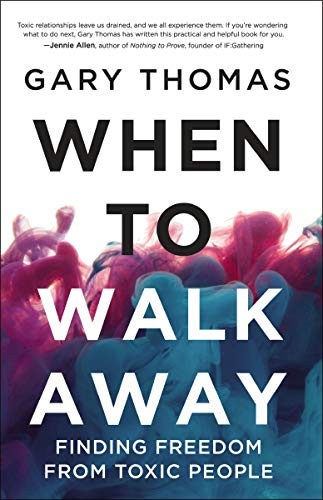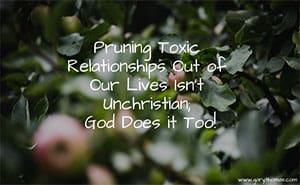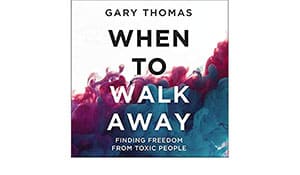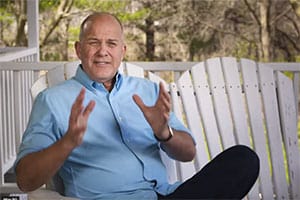Opening:
Excerpt:
Gary Thomas: And so if we walk in the footsteps of Jesus, there will be times where we walk where we don’t have to let ourselves be beaten up, we don’t have to let ourselves be torn apart that, in fact, we should be looking for where we can do the most good and not lose that time and effort and obsess over the fact that, uh, people will oppose us.
End of Excerpt
John Fuller: That’s Gary Thomas describing the challenges that many of us face with toxic people and why sometimes the best response is to just walk away. Gary is back with us today on Focus on the Family. And your host is his Focus president and author Jim Daly. I’m John Fuller.
Jim Daly: Well, John, the key question is right in Gary’s title, When To Walk Away – because we struggle with that. We stay in too long, and we get crushed. Uh, we get out too quickly, and maybe God hasn’t done the work he wants to do through us in that relationship. You never know. But we learned a lot last time about Gary’s perspective and his scriptural backing for what he was talking about – that, uh, like in John 10:10, the thief coming to steal, kill and destroy, metaphorically, that’s true even in relationship – people that suck the life out of us, they are looking to really control you and to demean you and to really ruin you. And it’s so unhealthy. Especially for those of us that call ourselves Christians.
Before we get back into that conversation with Gary, uh, we should remind everyone of some important caveats. Um, not every difficult or angry or needy person you meet is gonna be classified as a toxic person. And we mentioned that last time. If you missed it, get the download, get the CD, if that’s how you’re still listening to stuff. The download’s easier. Or download the mobile app so that you can listen to it and pass it along to somebody who might need to hear it too.
The caution there is, don’t use that label too broadly. Also, Christians can be toxic. It’s not just people who are outside the faith. I’d say we have a greater propensity ‘cause we can be a bit self-righteous about us. And that’s a pharisaical heart.
The fact is we can all have toxic moments, where we’re prideful or angry or we let our flesh, uh, get the best of us rather than, uh, the Holy Spirit working through us. And that’s why I’m so grateful to have Gary back today to clear up all the stuff he said yesterday. (LAUGHTER) I’m just kidding! Gary, it is a tough subject. And I’m looking forward to today’s discussion.
John: Well, as we mentioned last time, Gary is an author, a speaker, a teaching pastor. And, uh, Jim, you mentioned his book that really forms the basis for this discussion, When To Walk Away: Finding Freedom From Toxic People. Uh, give us a call if you’d like a copy – 800, the letter A and the word FAMILY.
Body:
Jim: Gary, let’s just start with the simple, most obvious question. Can Christians who are trying to live faithfully actually help a toxic person?
Gary: I would go back to Jesus’ word. When we’re talking about a truly toxic person – and I love the distinction you made that difficult doesn’t mean toxic. Different doesn’t mean toxic. For instance, if you’re like me, you tend to go toward gentle and polite. That doesn’t make a forceful person toxic. They just have a different way of relating.
But when you’re dealing with a truly toxic person, I don’t think that we can help them until God does that first work in their heart. And I would just go back to Jesus, who said, “Don’t throw your pearls before swine. Don’t give good kosher food to dogs.” And when you look at that passage, Jesus is making it very clear. He says, “Why don’t you give your pearls before swine? Because they will turn and tear you to pieces. A pig doesn’t understand how valuable a pearl is.” Today, women think of strings of pearls – not in the first century. They didn’t have synthetic pearls. Pearls were difficult to get. They were so valuable – Jesus said the parable about the man who sold everything he had for one pearl.
So here is the very level of luxury given to a pig. The pig can’t appreciate the beauty of that pearl. The pig can’t eat it. And so he spits it out, and he’s angry. “You’re not giving me what I want.” He wants the pig slop, which you could buy 10 years of for that one pearl that he just spit out.
And Jesus is basically saying, “I don’t want you to be unnecessarily abused by interacting with toxic people that can’t appreciate the good stuff you’re giving them. They don’t appreciate that you’re acting out of love. They’ll turn and tear you to pieces.”
Every believer’s minutes count, but not all of us think they do. If you think your minutes count, that the Holy Spirit can use you in powerful ways, Jesus is giving you such valuable advice. I wanna help you be more effective.
What I have adopted is this, four words that have spared me, no conviction, no counsel. If I don’t sense conviction in a person’s heart, I’m not gonna give unwanted counsel. It doesn’t help them. It makes them angry, and it usually causes bad stuff. If I’m seeing conviction, I wanna be generous with my time. I wanna go overboard to give them focus and attention.
But, again, real ministry is supernatural. We need the spirit’s conviction. Paul says, “Without the spirit, the unspiritual person can’t receive the good things that God wants to give them.” So take ourselves off from being these self-proclaimed messiahs that are able to reach everyone and just say, “Am I cooperating with what God is already doing in this person’s heart, or am I opening myself up to unnecessary abuse by trying to get somebody to understand something that they’re not ready for?”
I just had, uh, oral surgery before I came here, week before I came here. If a man strapped me to a chair and did to me what I paid that oral surgeon to do…
Jim: (Laughter) I know where this is going.
Gary: I mean, I’d call the police. I’d turn him in. How can you do that to somebody? I paid him to do it because I knew I needed it. I had a root canal that had gone bad. They showed me the pictures of the infection. Your whole body is fighting this infection. You need to get that tooth out. So I endured the pain. I endured the pressure. I did the recovery because I knew I needed it. It’s the same thing spiritually. If a toxic person doesn’t know their need for the truth, you’re just going to cause grief for yourself by trying to offer it.
John: Hm…and what, Gary, what makes a toxic person toxic? I mean, what’s behind that control and all that – uh, that stuff that they bring?
Gary: I do think there’s a notion where our past hurts can lead us toward toxicity because we’re just kind of responding as hurt people. But I think the biggest reason really is pride. We talked yesterday about the components of a toxic person – control, uh, a murderous spirit, loving hate. Those are all things of pride. “You’re not doing what I want you to do. I’m gonna get you to do what I want you to do.” “What matters is that I get to vent my anger, not how it impacts you. There tends to be the sense that they’re not even aware that they’re acting this way.
John: Hm.
Gary: And, in fact, I found when toxic people are called toxic, they will give you an 11-page, single-spaced email that proves you are wrong in calling them toxic (Laughter), and you are abusive for calling them abusive.
Jim: Man, that’s amazing. Hey, Gary, uh, let’s talk about Jesus’s mission-mindedness…
Gary: Yes.
Jim: …If I could say it that way.
Gary: Yes, thank you.
Jim: Because I think that brings us back to something positive and how to filter this abusive mentality that we can encounter. So how did Jesus being mission-minded, how did that help Him stay, uh, on the path?
Gary: I’m so glad you brought that up, Jim, because, again, I’m speaking as a pastor and Christian writer, not as a psychologist. So this really isn’t primarily about psychological health, though I think that’s very important. And I’m not undercutting. There’s just better guests you could have to address this.
This is about protecting your mission before God. Jesus was a mission-minded person. He tells us in the heart of the Sermon on the Mount, “Seek first the kingdom of God” – Matthew 6:33. And it’s in a continuous tense – continually keep on seeking first the kingdom of God. When I wake up, my passion is to be what does God to have for me to do today? Who does God want me to reach? Who does God want me to give my life to? This isn’t about me not being bothered by people. I live to be bothered by people, the people that God wants me to be bothered by. It’s not about me not facing uncomfortable situations. As God’s Son, half of ministry is being involved in uncomfortable situations. It’s about being productive in those situations.
To seek first God’s kingdom. So Matthew 6:33 is the first lynchpin. The second one for me is 2 Timothy 2:2. And this is where it was drummed into me in college ministry by a wonderful campus pastor by the name of Brady Bob, and I’ll be forever grateful.
Where it’s the paradigm where Paul says to Timothy – here’s a young man going into ministry – and Paul says, “Timothy, whatever you’ve heard me say, entrust reliable people who are qualified to teach others.” He didn’t say, “Timothy, go find the kooks, go find the toxic people, go find the crazy people and try to rein them in.” He says, “Timothy, you should be on the lookout. Your seeking first the kingdom of God is finding reliable people so that it’s not just about you. You’re launching dozens of people who have your passion, your understanding and your experience so that we’re multiplying workers wherever we go.” That’s the spiritual offense that gives us guilt-free paradigms to play spiritual defense against the toxic people who keep us from doing what God created us to do.
Jim: You know, Gary, when you’re in this battle, it can be hard to kind of stand down. Even though Jesus encountered many of the Pharisees and Sadducees who – uh, you know, he basically posed a question and then stood down. Even Pontius Pilate – you know, He’s the son of God, he could have made that all different. But God, the Father, had a plan that needed to be fulfilled for our sake, for our salvation.
So you, as a follower of Christ, how do you not try to sort all these people out that are toxic? How do you stand down and say, “OK, God, um, this is for you to deal with, this is a God-sized problem that is beyond me?”
Gary: I’m looking to see whether this is still a productive encounter. Am I learning something? Are they learning something? Is God’s cause being furthered? Or is this just debilitating? Is this turning into just a quagmire and a mess that needs to be avoided?
But here’s the other thing, Jim, I’m not a psychologist. I imagine most of the people listening to this program are not psychologists. We can’t do diagnostic tests, and I don’t think we need to. What’s helped me is I realized I can’t reach everybody on this planet.
And if I just feel like this isn’t a productive situation with someone, because I’m part of a church, because I believe in the reality of God who is building His church, I can say, “Lord, I commend this person to you. I pray that you bring someone who has the patience for somebody just like this or maybe who has the word.” Or maybe I just need to say one sentence. Or maybe it’s the way I respond that will soften their heart for somebody else to follow. But I take great comfort that God is the one who’s building his church, that God can bring other people, that everything isn’t on me.
I’m just a tiny little part of what God is doing in any given day. I’m not the Savior. I’m really more like an Uber driver taking people towards the Savior. And I might not get them all the way there. I might drive them one block, but God’s…
Jim: In a four-mile journey. Right.
Gary: But God’s got somebody…
Jim: I like that.
Gary: …Else that’s gonna pick him up…
Jim: Yeah.
Gary: …And take him there. So I think humility serves us well in recognizing we won’t be able to reach everybody, but that doesn’t mean God doesn’t have a backup plan.
Jim: Yeah.
Jim: Describe how we can learn blessed patience. I like that concept. It comes out of the seventh century, I think, when you attached it to the monk. So monks had a lot to say about human behavior back in the sixth, seventh, eighth century.
Gary: Yes.
Jim: What did you capture from this particular monk?
Gary: This is from John Climacus. He wrote an Eastern classic called, The Ladder Of Divine Ascent. And I like to quote these holy people because they’re so much better (Laughing) than me in applying this. And I can at least explain it if I haven’t lived it.
But he talked as if any true worker of God, any true servant of God, is going to have pushback and what we want to do to move through it. So there are three stages he talked about. The first one is that we accept dishonor with bitterness and anguish of soul. Maybe you spoke up with completely good intentions, and a friend of yours is saying that you were judgmental, or you were heartless. And – and it’s hard to get to sleep. You can’t believe others are gossiping about you.
You still believe you said the right thing, but it is just anguishing to have people speak negatively of you. For some of us, that’s really hard. Other people can just…
Jim: Right.
Gary: It doesn’t bother them.
Jim: That’s that personality.
Gary: But for a lot of us, the golden retrievers that we talked about yesterday, that – it’s really hard.
But he said the second one is that we get to a point where it doesn’t bother us as much. We’ve been through it. And so there’s a certain level of freedom and disconnect because we say, “You know what? That’s their issue. And the fact that they’re wrong doesn’t bother me because God knows I acted with good motives. I believe I acted how God wanted me to act. And so I’m just not gonna let it bother me. This is a part of what it means to serve the Lord.” I’ll never forget when I talked to John Ashcroft…, who was a former governor of Missouri, a senator of Missouri, once a presidential candidate. Just a wonderful Christian man. And I’m so inspired by his faith. He was a very devout man. His father was president of a Bible seminary. He lived his faith. I mean, I don’t have time to give examples, but this was a man who gave generously to God… and the way his opponents would talk about him…
Jim: Attack him.
Gary: …In elections…
Jim: Yeah.
Gary: …That I knew not to be true. And I asked him one time, “John, how do you put up with this?” And I was just amazed. He says, “Gary, don’t go into politics if you don’t want people to lie about you and misrepresent you. They are paying consultants hundreds of thousands of dollars to twist everything you say into a negative so that the opponent gets elected. That’s the game. If that’s gonna drive you crazy, you’re in the wrong business.”
Jim: Wow.
Gary: It’s sort of like…
Jim: That’s…
Gary: …Becoming a…
Jim: That’s thick skin.
Gary: …A boxer who doesn’t want to get hit. You know, I asked Evander Holyfield one time – I did a book with him. And I said, “How come you guys hug after a fight? And you’ve just been beating each other up.” And he said, “Gary, we don’t take it personally. If you don’t want somebody to hit you, why are you a boxer?” I mean, it’s – so that’s kind of where you have to go in Christian ministry, where you get to the point of, OK, this is a part of Christian ministry.
The third one though, this is – I can’t say I’ve gotten there, but he says we accept dishonor as praise at some point. I must really be doing something – what Climacus would say later is the fact that you’re being shot at means you’re in the war. You’re doing a good work. Satan isn’t letting you be ignored. Satan isn’t letting you go unchallenged.
And so you must be doing something right if people are trying to get you to stop doing it. And so first, you accept it with anguish. It takes a couple episodes where you learn that. Second, OK, it doesn’t bother me so much. That’s a part of what it is. And third, you accept dishonor as praise. And it’s interesting – you could apply all these three to parenting…
Jim: (Laughing) Oh, yeah!
Gary: …As well as ministry.
Jim: Oh, yeah!
John: (Laughter) Well, we’re gonna post, uh, just a summary of what Gary was just saying – that quote, uh, and those three points. So you can go online and see that. Get the whole book of course, When To Walk Away: Finding Freedom From Toxic People. The website is focusonthefamily.com/broadcast.
Jim: Gary, you reference Acts 16, where the apostle Paul and Silas are in that, uh, prison, I think at midnight or late into the night. What can that episode teach us, uh, about how we should respond to at least toxic situations?
Gary: It’s a wonderful passage. I’m glad you’re going there, Jim, because talking about toxic people could raise our defenses. It could give us an attitude of war. It could…
Jim: Yeah.
Gary: “I’m gonna make them pay for it. I’m not gonna put up with this anymore.”
But Paul had such a mature attitude. What had happened is that he and Silas had freed this poor girl who had been beset by demons and was being exploited by her owners. He delivered her from the demon. God used him to deliver her from the demon. And so suddenly they arrest Paul, and they beat him up. And it’s, you know, really an issue of, “You took away our livelihood, and you’re gonna pay.” So he’s in a prison. And this is a first-century prison. You’re shackled. It is awful. And he’s there. And it’s such a beautiful passage. It’s late at night. He and Silas, instead of commiserating or blaming God, they’re worshipping. And the other prisoners are listening.
And suddenly, in the middle of the night, everybody’s shackles (Laughter) miraculously break apart. The doors of the prison open, and they can go free. And the guard wakes up, and he sees the doors are open and everybody’s unshackled, and he realizes what’s gonna happen, so he pulls out his sword to kill himself because he knows, well, they’re going to kill me. And it’s gonna be…
Jim: Meaning the Roman.
Gary: Yeah.
Jim: Leaders.
Gary: Roman leaders. He goes, “The Roman leaders are gonna kill me for disregard of duty. And so it’s gonna be far less pleasant.”
Paul sees what’s happening and he cries out, “Wait. Stop. We’re all here.” And what hits me about this is Paul had been so unfairly treated. They had beaten Paul up, murdering his health. They had stripped him, murdering his dignity. They had imprisoned him, murdering his freedom. They had brought so much murder to him, and he could have said (laughter), “He’s gonna get his due. Here it is. Let him have it.” Instead, Paul says, “No. We’re here. Don’t hurt yourself.” And what that tells me – God’s people always want the murdering to end. We don’t want to become toxic in opposing toxic people. And Paul shared the faith. The guy brought his family, and the Bible tells us he and all his household…
Jim: Were saved.
Gary: …Were saved.
And it’s reminiscent of Jesus. What astonished people with Jesus and the lepers is that he didn’t become leprous when he worked with leprous people. That’s a great physical picture of what we’re to do spiritually. Can we touch the toxic without becoming toxic, wanting to control them, wanting to murder them, hating them?
That is difficult, and we will fail because what I’ve found, toxic people are a whole lot better at being toxic than we are at dealing with them (laughter) because they’ve been toxic their whole life. And for some of us, we feel like we’re going crazy. We don’t have the labels to deal with it. We don’t have the experience. And at first, we question ourselves. “What could I say that could make them so angry? Why do they hate me? I’m so insignificant. I don’t even matter. Why can’t they let it go?”
But in the midst of that, just for our own spiritual welfare, we’re people who are called to bring life; we’re people who are called to bring peace. And this is why walking away is so important. I found one of the best defenses from becoming toxic is to walk away before I become toxic (laughter), not to overestimate my ability to interact with them. And so sometimes the best way to avoid becoming toxic is learning when to walk away from others who are toxic.
Jim: You know, Gary, the last couple of days, as you’ve described toxicity in people, uh, that power of compassion, which is the opposite of pride, the ability to express compassion, to counteract that toxicity, not only in the person that is toxic, but when it sprouts up in ourselves. Speak to that issue of compassion and how compassion in some ways is the antidote to that, at least in our own heart.
Gary: When Paul says that the people of God are marked by compassion and kindness and gentleness and patience, he’s laying out the road map that that’s our response toward people. Rather than hurting people, we want to be kind to people. We want the interaction to show that we would like to help you, not hurt you. Compassion means, rather than pile on your hurt, we want to feel empathy for your hurt. Patience means, rather than expecting you to be perfect in an imperfect world, as an imperfect person, that we’re able to extend to you the same grace we’ve received from the Lord. And for me, Jim, what helps me live that way – again, I go back to Colossians 3:12. When I remind myself that I’m chosen and dearly loved, that God chose me, so if everybody else rejects me, the one who matters most, the God of the universe, has chosen me, and I’m dearly loved. If everybody else hates me, if everybody else is attacking me, the one that matters most to me dearly loves me.
And so when I live out of that, I can face rebellion of kids, I could face an attack from those I love and minister to and any other situation in life. So I believe that living a life of compassion requires us to receive that compassion from God first. First John 4:19 – “We love because…”
Jim: “He first loved us.”
Gary: That’s exactly right.
Jim: Yeah. You’ve admitted that your own self-talk tended to be pretty toxic in the past. And I appreciate that self-awareness. Uh, but what did it sound like to help the rest of us if we’re not identifying it in our own lives? And how did you begin to change that habit? Which is the most difficult thing – to change that habit.
Gary: I wanna be a good example for what I teach because the Gospel has meant so much. It’s my life. I mean, the words of the New Testament, it’s a spiritual feast. And I know that they’re true, but I don’t always live them out.
The best way to gain weight is to write a book that connects caring for your body with discipleship (Laughter) which I did writing Everybody Matters – maybe the stupidest thing I’ve ever done!
Jim: OK, how much weight did you put on?
Gary: I gained 20 pounds after I wrote that book! (Laughter) Now, I was really skinny. I was running fast marathons when I wrote it, so I could handle…
Jim: You had some room to grow?
Gary: I had some room. But – but then when I’d do that and then I would step on the scale, and it would be like, your life happened. You’re busy. You’re caring for others.
Jim: (Laughter) Eating out a lot.
Gary: And then also, “Gary, you’re so weak, and come on, you’re a hypocrite.” And in some ways, I am. I mean, I believe those words are true. I don’t always live up to them. And I could just be awful, until I realized how much I was hurting God by the way I was talking to my myself.
Because if I’m chosen and dearly loved by God, talking negative about myself, someone he loves, hurts him. And I felt God challenged me with the words, “Don’t say anything to yourself that you wouldn’t say to those you love.” And I said a lot of things to myself. I would never say to my wife, if she stepped on a scale and didn’t like what she saw, what – what I said to myself. I would never say to my kids’ words that I used to tear down myself. And so if God doesn’t want us to be toxic to others, and he doesn’t want others to be toxic to us, that includes the fact that he doesn’t want us to be toxic to ourselves.
One of the reasons I wrote this, Jim, that I didn’t know until after it was written, I didn’t understand how hurt God is when he sees his people bullied and when he sees the way that toxic people have taken advantage of some sensitive, well-meaning believers that are allowing their lives almost to be terrorized. They’re allowing themselves to be traumatized. And I think if the listeners could realize how much God loves you, he wants you to walk away, how much you’re worshipping God when you walk away because he hates it that you’re being bullied, and so when you remove yourself from a situation where you’re being bullied, you make God happy, you bring God Joy. You’re not an orphan. You were created, and you’re loved, and you’ve been adopted by a God who is passionate about your welfare. And I believe this book could be and this broadcast can be His message. “Serve me by walking away. I don’t like what’s happening to you. I want it to stop. And perhaps I even inspired this moment and for you to be here so that you could serve me by learning when to walk away.”
John: Hm.
Jim: Gary this has been a wonderful conversation the past couple of days. It’s a difficult topic, and we’ve said that throughout our time, uh, John. But I appreciate your heart, to help Christians work through this idea of toxic relationships. And your reminder of the vital mission that God has given each one of us. And it’s tough. You do not find a lot of resources on this topic. And I’m hopeful that our listeners will resonate with it, uh, maybe struggle with it, wrestle with it, try to get a better understanding of a biblical, uh, approach to dealing with toxic people. I think you’ve laid a great foundation here, Gary, for us to think it through and really talk it over with the Lord.
Closing:
Jim: Uh, if our conversation today has brought to mind that toxic relationship that is in your orbit that you may be struggling with, or maybe you’re realizing, “Maybe I’m that toxic person,” contact us here at Focus on the Family. We don’t have to stay in that place. And we’d like to connect you with one of our counselors. They can listen to your story and help you and pray with you and provide more tools to move you into a more positive place. Don’t wait to get help that you need. Call us here at Focus on the Family.
John: Our number is 800, the letter “A” and the word FAMILY. 800-232-6459. We have a find-a-counselor referral tool and a lot of great resources as well, at focusonthefamily.com/broadcast.
And if I could, let me encourage you to become a monthly pledge supporter of this ministry or make a one-time gift. Either way, your gift of any amount will, uh, really fuel our engines so it can continue programming like this. And we’ll say thanks by sending a copy of Gary’s book, When To Walk Away, as our thank-you gift.
Jim: Gary, again, thanks for being with us. This is really tough, but good stuff.
Gary: Thank you so much for this opportunity.
John: And on behalf of Jim Daly and the entire team, thanks for listening to Focus on the Family. I’m John Fuller, inviting you back as we once again help you and your family thrive in Christ.


























